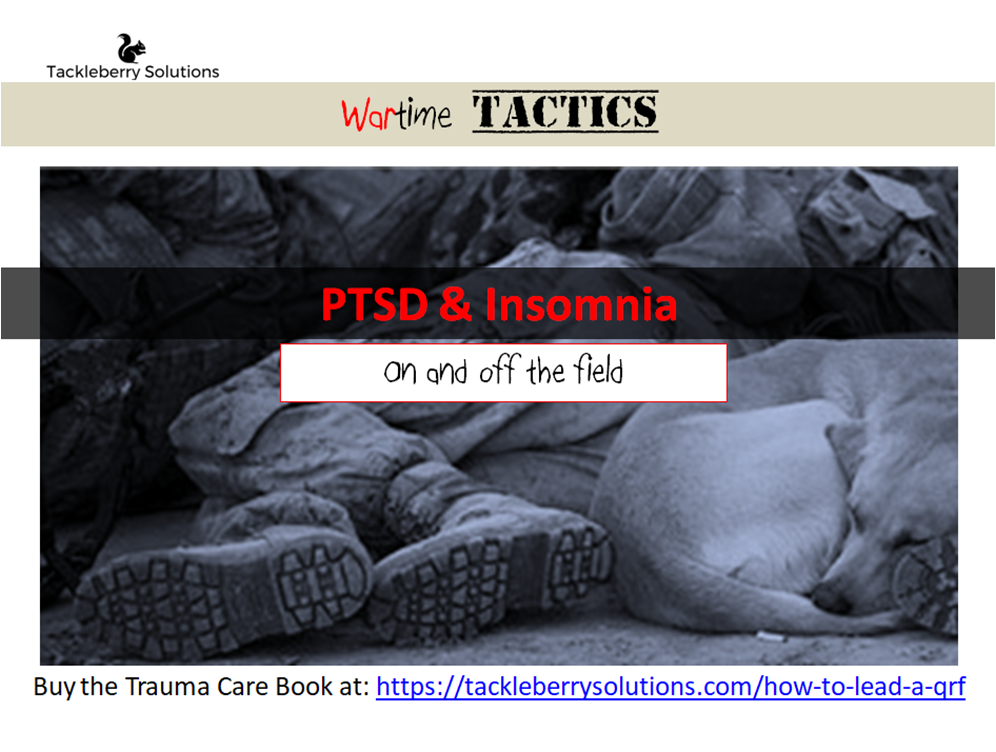Wartime Tactics: The dangers of PTSD and Insomnia on and off the field.
PTSD or Post Traumatic Stress Disorder: Something else I am personally familiar with as I have had it. Thank God it was in a mild form. PTSD is so common in combat vets that out of a team of 20 guys that I worked with in my last unit, over 12 of us had it. (The other 8 were new guys.) Some guys can learn to function with it.
Pitcher, my buddy from 1/9 Bravo Recon couldn’t turn loose of the pain and guilt he was feeling. To his defense, his situation was freaking seriously screwed up. He lost more than one buddy in the same tour. He was there in 2007 for the Tal Afar, Catania, and Al Jazzera bombings (We were conducting several days of non-stop search and rescue ops for all 3 of those.); and the list goes on.
Signs and Symptoms
- Behavioral: Aggravation, irritability, hostility, self-destructive, social isolation.
- Psychological: Flashbacks (This is more commonly seen while they are asleep, at least it was for me), fear, extreme anxiety, mistrust.
- Mood: Loss of interest in normal pleasure activities, guilt, loneliness.
- Sleep: (HAHA..funny...what sleep.) Insomnia and night terrors.
- Emotional detachment and/or unwanted thoughts(i.e. homicidal/suicidal thoughts) is also very common.

Illnesses like PTSD will often NOT show their head until its too late. What’s worse is these illnesses can effect more than just that one soldier. It can get your whole team killed... even you.
On the Field
While commonly over dramatized, PTSD on the field in a hot zone can be very dangerous. It can get your whole team killed. If you're team is in a war zone, the last thing you want is to question your guy's ability to function under pressure. Read on and I will give you a few tips on how to diagnose and handle PTSD in the field.
The following information comes from Trauma Care Book 5 of the QRF series.
Side Note: Personal Experience with PTSD
I once had a wake-up call with my PTSD issues in a Wal-Mart parking lot with a dude that pissed me off on the wrong day. He was trying to bully me - and if there is anything on this planet that I detest the most, it would be bullies. I was able to handle the threat without pulling my gun or killing anyone. However, I did react a bit overly aggressive - was I suffering from PTSD? Yep! (A mild form of it) Was I a danger to others? Nope! Was I combat effective? Oh hell yes!
While I have never received any “Official” treatment, I did start talking. And who do you think I talked to? My medic.
Manns was his name, we had been through HELL in Iraq together. I felt I could trust him. That’s why I'm telling you this. Because, if you’re the medic or team leader, they will come to you when they realize they need help. Then you will have a serious decision to make.
Thanks to Manns, I was able to start to recover and get a handle on my PTSD. And I did it without losing my status or position on the team. See, I came to him. That meant that I had realized this issue and was ready to make changes in my life.
It’s the ones that don’t come to you, that you have to worry about. The guys that try to hide it behind a bottle or simply will not accept the fact that they aren't thinking clearly. So what I’m going to give you for treatment will vary on the situation. You will have to use your best judgment, just remember, that the team comes first.
Treatment Plan A:
Treatment: This will vary on the person, depending on their personality. Its all about getting them to reconnect with their roots and facing the events that have taken place. They need to accept what happened and try to find compassion for others (I found that very hard.)
The biggest thing that helped me and others, is just time. If you can get them enough time, they will come full circle. That’s why I left active service and went to the reserves. When I was ready, I went active again.
Side Note:
The night terrors still happen, but I recognize them quicker now and have learned that I can control my dreams. So I change the dream to something cool. For example, the last time I had a night terror, it started with a guy trying to hurt my kid. I was trying to kill him, but I couldn’t get the pistol to fire. I recognized that this was a dream and changed it to me chasing my son. It quickly went from scary as hell to me playing with my son. (This was a trick that Manns taught me.)
I dealt with my problems by camping, getting more into wilderness exploring, survival, and shooting. This helped me release tons of building anger. It became a weekly routine for me. Because of this, I had something to look forward to while at work. It made it easier to keep a cool head for the rest of the week.
The disruptive thoughts eventually left all together and I got married. It was rough adjusting to the new family life, but my wife is a great woman and helped me through the change.
How I dealt with PTSD
Mann’s remedy for me was daily PT, weekly camping/exploration trips, lost of shooting, controlling the dreams, and God. Yeah, that’s right, I’ve been LDS my whole life. But I wasn’t really into the church until after that. Manns got me to read the Bible and Book of Mormon for the first time. (Funny thing is he’s not LDS...I think he was Catholic.) Which religion wasn’t the most important thing, so long as it preached love, forgiveness, repentance, and compassion...it will work.
I had to go to church no matter whether I wanted to go or not. I started to actually listen in class and slowly I converted myself. I found my compassion for others and built my relationship with our heavenly father. Slowly the anger I had been feeling left, and I was much closer to the man I was so many years before.
So long as I was willing to do what Manns said and talked to him regularly, he felt comfortable with keeping my secret. He later told me that he had already noticed the issue with me and was wondering why it took so long for it to manifest while others in my unit had been undergoing treatment this whole time. He also told me that if I had not came to him, he was going to enact plan B. That's what I’m about to tell you next.
Treatment Plan B:
As you can see, plan B usually ended our careers. So Manns was doing me a solid by keeping this under wraps. Because he was a bad ass medic, he was really treating several of us on the team and keeping it all under wraps.
The thing was, we had all recognized that we where suffering from something and we all trusted Manns. Thus Manns felt that we could receive treatment from him with assistance from a Capt. and continue to safely work. He was right. We were all able to work for awhile after that and did just fine.
We just continued our “treatment” and talked to each other about it. A few of us started calling it “Group Therapy Session.” Still to this day, we call each other and arrange days to get together and do our “Group Therapy Session.”
PTSD isn’t the end of the world. It doesn’t mean that you’re going to kill everyone or are going to go on a rampage. It just means you need some space, that you need to talk it out with someone that’s been there, and time.
PTSD Off the Field
The following article was written by Brad Krause in regards to getting a restful sleep when suffering from insomnia.

3 Ways Vets Can Enjoy Better Sleep Without Breaking the Bank
Sleep is a basic cornerstone of wellness, both in terms of our minds and bodies. However, those military vets are at high risk for insomnia. So if you’re battling with insomnia now that you’re a civilian, here are some of the things that can improve your sleep at little to no cost.
Your comfort
When it comes to getting quality sleep, there’s no better place to start than your own bedroom. In fact, your ability to sleep better can be unleashed as easily as tweaking your sleep environment. Indeed, optimizing your bedroom for sleep is more important than most people realize, so it’s a good idea to consider the variables that make for a sleep-friendly bedroom, such as noise, temperature, lighting, and bedding.
Of course, a complete overhaul of your bedroom may seem like a tall order, particularly in terms of cost. Thankfully, there are several ways to save on things like comfortable pillows and bedding, and even sleep solutions like white noise machines or weighted blankets, when you turn to bigger retailers like Bed, Bath & Beyond.
Not only do they offer free shipping when you spend $39 or more, but you can also stretch your dollars further by adding a Bed Bath & Beyond promo code to your purchase. It’s an easy way to double-dip on savings, and deals websites also pile on cash back opportunities for future purchases.
Your routine
It may come as a surprise to some, but as Thrive Global explains your daily routines actually have considerable bearing your ability to fall asleep and stay in restful sleep. It’s a good idea to take stock of these routines to know what contributes to good sleep, as well as the lack of it.
Your nighttime routine is a great place to start. As a rule of thumb, it’s important to go to bed at about the same time every night in order to regularize your circadian rhythm—that is to say, your body’s internal clock that dictates your sleep/wake cycles.
It’s also crucial to have a wind-down routine in place, which includes avoiding the use of blue light-emitting gadgets that hamper melatonin release. Doing light stretching, meditation, and other relaxing activities before bedtime sets a restful tone.
Your daytime routine matters just as much, too. There’s no better way to put your circadian rhythm out of whack than by waking up late or napping too long during the day.
Psychology Today notes it’s also a good idea to incorporate exercise into your daytime routine, as well, as regular exercise is a contributor to quality sleep. Best of all, you don’t need expensive gym memberships or costly workout gear to exercise. Rather, this can be as simple as a morning run outdoors or even an at-home workout using free workout videos or low-cost fitness apps.
Your therapy
Finally, there’s professional help available for veterans with chronic sleep issues. It’s prudent to make use of the many resources that the government and nonprofits have put in place to get the help and therapy that you might need. There are actually a good number of possible treatments in place specifically dedicated to veterans who can’t sleep, which are often free or government-subsidized, so connect with your local VA office for assistance.
Sleep deprivation is a reality for many veterans, so you are definitely not alone in this struggle. Consider the many affordable ways in which you can sleep better and take advantage of the free help available to you. Addressing your sleep problems once and for all will set you up for a better quality of life.




